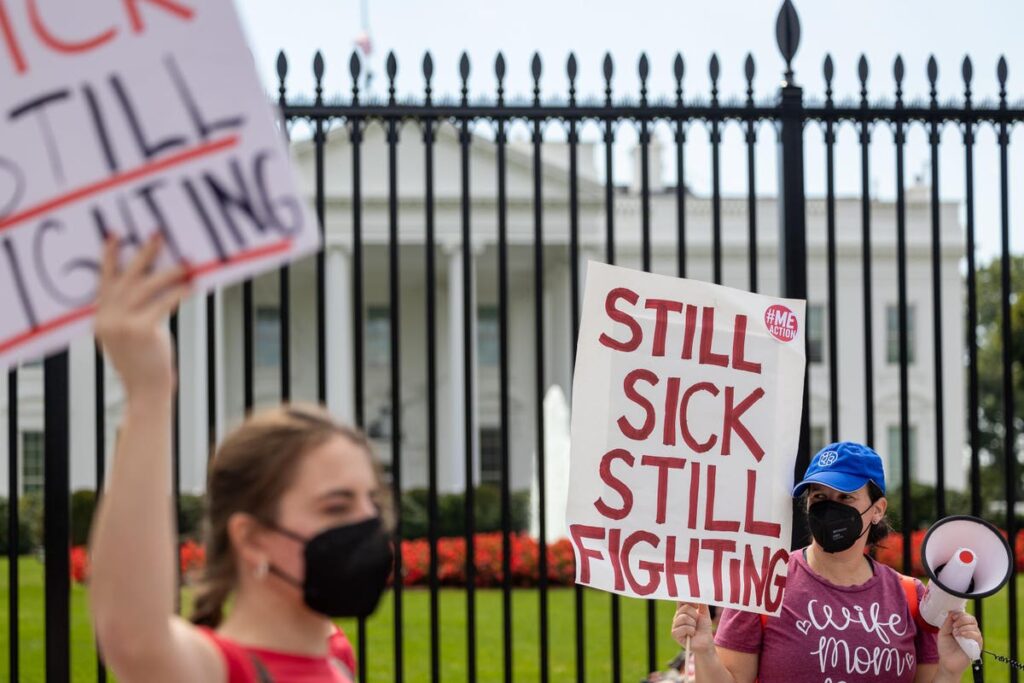Washington DC, USA- September 19: Protestors march outside the White House to call attention to … [+]
Three years after the novel SARS-CoV-2 virus afflicted hundreds of millions of people worldwide, researchers are now grappling with the challenges of understanding the underlying mechanisms and causes of long Covid. More than 67% of people living with long Covid in the United Kingdom have reported that suffering from prolonged Covid-related symptoms has significantly affected their ability to complete daily, routine activities. Out of that, at least 19% had Covid almost two years ago.
People living with long Covid continue to fight a long and lonely battle against chronic fatigue syndrome or myalgic encephalitis. Other symptoms include memory, concentration and sleep problems, shortness of breath, and persistent cough, among others. In a new study that included 200,000 adults, researchers found that people who live in the most deprived or poor areas are at a 45% higher risk of having long Covid than higher socioeconomic groups. But the risk shot up even higher among adults from deprived areas if they also worked in two sectors: healthcare and education. Healthcare workers faced a 76% higher risk irrespective of whether they were in patient-facing or non patient-facing roles. Teachers living in poor areas faced a 64% higher long Covid risk and 62% for those working in jobs within the education industry.
ADVERTISEMENT
The study was published in the Journal of the Royal Society of Medicine on May 10, 2023. Lead researcher Dr Nazrul Islam, from the Nuffield Department of Population Health at the University of Oxford, and colleagues, wrote: “The disproportionate impact of pandemic on people living in deprived areas may partly be due to having greater concentration of minority ethnic groups, higher prevalence of chronic medical conditions, occupational exposure, heavy reliance on public transport, crowded or multigenerational households, and limited access to healthcare.”
“Occupation is particularly important because workplace setting can modify exposure risk (e.g., a higher exposure risk for public or client facing roles) as well as the effect of the exposure on various COVID-19 related outcomes,” they further added.
The team further found that women had a far higher risk of developing long Covid. In fact, women who are from the least deprived areas face the same risk of long Covid as men living in poor areas.
ADVERTISEMENT
These findings are similar to previous studies that reported w0men are at a higher risk. In addition to that, an individual’s age and comorbidities are also contributing factors. And whether they smoke or not. One study also found that Covid-19 patients who experienced more than five symptoms during the early phases of getting infected were at least 3.5 times more likely to develop long Covid than those who were asymptomatic or had fewer Covid-19 symptoms.
“Previous evidence, together with the results from this study, suggest that inequalities in long Covid cannot be viewed in isolation without considering the role of occupation in a gender-blind manner,” the researchers concluded in their study. “This indicates the need for a diverse range of public health interventions after recovery from Covid (treatment and/or rehabilitation) across multiple intersecting social dimensions as well as data for reducing disproportionate impact on these populations in any future waves of the pandemic.”
“Our findings highlight the necessity of managing post-recovery of Covid-19 with a health equity lens,” they added.


